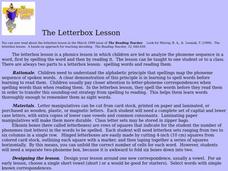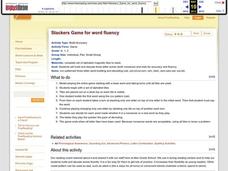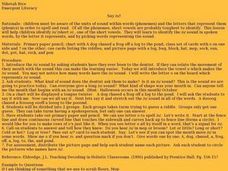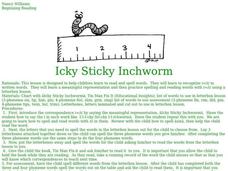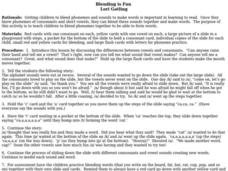Curated OER
Quick and Sticky Context Clues
Discuss strategies for defining word your young readers don't know. They read sentences with key words covered by sticky notes and guess from the context what the word might be. They peek at the first letter and guess again.
Curated OER
Community Ripple
Originally designed to be used along with a text that is not included, this plan contains a graphic organizer and word guessing game to help readers use decoding strategies to gain new vocabulary. A set of questions relating to community...
Curated OER
Heroic Vocabulary: Using Decoding Strategies and Thesaurus
Develop the decoding skills of your middle and high schoolers. Scholars participate in a classroom activity that requires them to decode a word with a prefix and suffix. They apply the skill of breaking the word into parts of meaning as...
Curated OER
Split Suffixes
Make new words by adding suffixes to word beginnings. There are four suffixes here: -ible, -able, -ive, and -ion. After using them to complete five given words, they use their vocabulary skills to apply the suffixes to words they think...
Curated OER
Prefixes
Learners explore prefixes, and how they help us decipher unknown words. Decode and define the meaning of boldface words with prefixes used in context on a classroom chart. Writers complete a worksheet practicing the same skill.
Curated OER
Phonics: Decode and Write Words with Blends
Kids see, say, then count the phonemes they hear in a series of simple words. They practice counting phonemes with the teacher, then sound out the same word on their own. As they count each phoneme they write it down on their paper. A...
Curated OER
Smart Board Syllable Activity
Young scholars divide words, using syllable division rules. They divide two and three syllable words. They follow Orton-Gillingham rules and use the first three division rules.
Curated OER
Phonics: Decode and Write Words with the “Silent e”
What happens when I add an 'e' to the word mad? It becomes made! Decoding and writing words with the silent e is the instructional activity for today. The class discusses what the e can do to a cvc word, then they practice adding e's to...
Curated OER
Phonics: Decode and Write Words
Sounding out individual phonemes and blending them to make a word is usually one of the first tasks mastered when learning to read. Make master decoders out of your learners, they sound out a series of simple two and three-letter cvc...
Curated OER
Fluency: Read Regular Words
Second graders engage in a timed choral reading activity to practice reading with accuracy and fluency. The teacher starts the timer and taps a reading rhythm on the desk as the class reads a series of words in unison. When the time is...
Curated OER
Phonics: Decoding Words in Connected Text
Decoding words in connected text can make emergent readers really feel like they are great readers. They work as a class to sound out simple cvc words located in super short sentences. Tip: Extend this activity by having a variety of...
Curated OER
Kites are Slow, Reading is Fast
Speed read with your third, fourth, and fifth graders. Learners pair up and work together to improve their oral fluency. Use the technique of covering up unknown words to isolate the vowel and decode the word. There's a sheet included to...
Curated OER
Vowel Sounds
This plan aims to increase the reading proficiency of your fourth grade class. While no materials are provided, a list of activities to practice are included. Various activities include creating songs for short vowel sounds, using cue...
Curated OER
My Reading Words in My Social Studies Book?
Connect social studies and language arts using this resource. After studying root words, have learners locate five words from their social studies book that have a prefix, suffix, or root word. This puts a new twist on practicing basic...
Curated OER
The Letterbox Lesson
Students analyze phoneme sequence in a word. They spell words using phoneme analysis and read new words using phoneme analysis.
Curated OER
Sight Words
Practice reading sight words using this resource. These aesthetically pleasing PowerPoint slides show 12 simple sight words such as mop, bat, and lip. This is a quick and easy way to provide a review for your kindergarten or first grade...
Curated OER
Stackers Game for Word Fluency
Explore words by building and decoding three-letter words. Real or nonsense words can be formed with the alphabet tiles. Practice fluency and blending sounds with CVC patterns.
Curated OER
Icky Insect Is In Icky Sticky Ink
Practice the strategy of letter-sound correspondence when identifying the short vowel /i/ sound in written and spoken words. The teacher recites the tongue twister "Icky insect is in icky sticky ink," while listeners repeat. Letter boxes...
Curated OER
Alexander said Achoo
Alexander asked for ashy amber apples! Have your young learners practice the /a/ sound with this tongue twister. Then learners will write the letter and participate in a book talk for A Cat Nap. Can they identify the target sound in the...
Curated OER
Icky Sticky Fingers
Practice recognizing the short vowel /i/ in written and spoken language. Introduce the target sound with a fun tongue twister about Lizzy the lizard. Through matching and listening activities, learners discriminate the vowel sound /i/...
Curated OER
Say /o/
Ollie the octopus is occupied! Use this tongue twister to help youngsters learn the /o/ sound. After practicing the target sound, learners should print the letter. When they are familiar with the letter and its sound, the group will...
Curated OER
Icky Sticky Inchworm
Use the meaningful example "Icky Sticky Inchworm" to demonstrate the /i/ sound. Then have learners take out letter boxes and spell simple words like six, lip, him, pin, slim, grin, etc.
Curated OER
Blending is Fun
Use a poster picture of a slide to illustrate the blending of phonemes in words. First show your youngsters basic examples like cat and cap. Then have learners work in pairs to create some blends of their own! Provide words for them to...
Alabama Learning Exchange
Phonics lesson for -ick family
Kindergarteners and first graders develop phonemic awareness for words that contain -ick. Each learner gets a stack of cards with different -ick words, highlighting the target sound as they review each one.
















